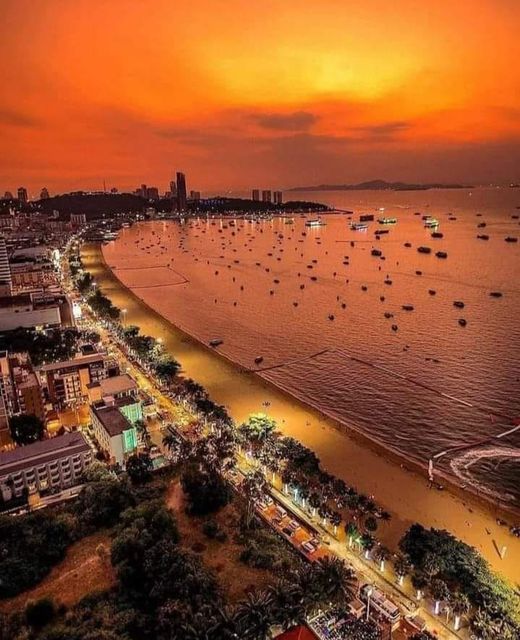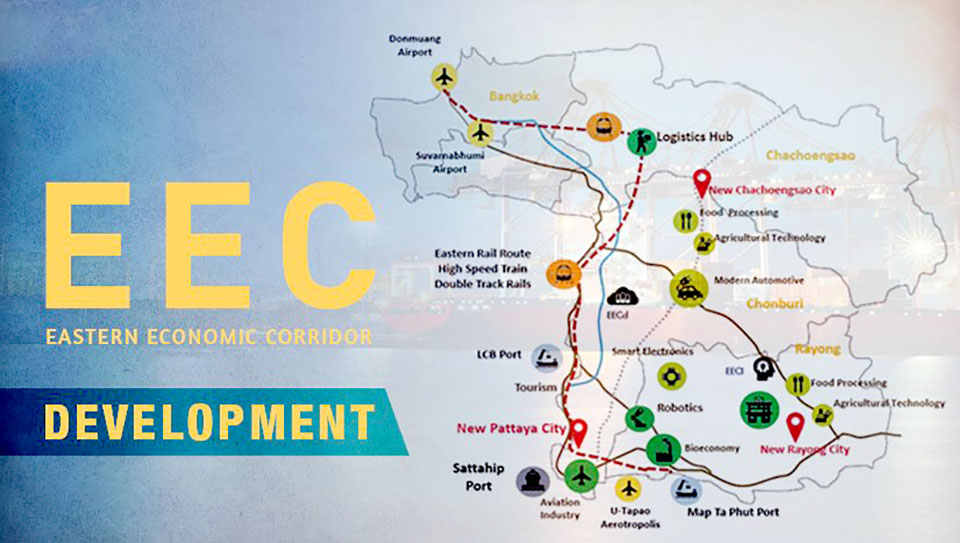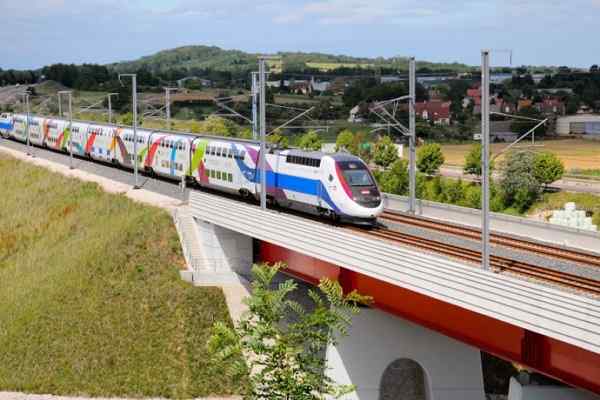Thailand’s ambitious high-speed rail (HSR) network is set to revolutionize travel and economic development across the country, with one of its most eagerly anticipated projects being the Bangkok-Pattaya-U-Tapao Airport line. This 220-kilometer route is a cornerstone of the government’s Eastern Economic Corridor (EEC) initiative, designed to enhance connectivity, boost tourism, and stimulate infrastructure growth in the Eastern Seaboard region. Scheduled for completion by 2029, this project promises to reduce travel times, increase property values, and attract investment, making the Chonburi province—home to Pattaya—an even more attractive destination for residents, investors, and tourists alike.
Project Overview: Route, Stations, and Timeline:
The Bangkok-Pattaya High-Speed Rail is part of the larger Three Airports High-Speed Rail Link, connecting Don Mueang International Airport, Suvarnabhumi Airport, and U-Tapao International Airport in Rayong. The line will feature several key stops, including:
Don Mueang (Bangkok’s secondary international airport)
Krung Thep Aphiwat Central Terminal (Bangkok’s main rail hub)
Makkasan (a major interchange station)
Chachoengsao (a growing industrial and residential area)
Chonburi (a key economic zone)
Si Racha (known for its industrial parks and seafood industry)
Pattaya (Thailand’s premier beach resort city)
U-Tapao Airport (an expanding aviation hub).
Construction Progress and Expected Completion:
As of June 2025, the project is in its advanced planning stages, with construction expected to begin imminently. The Thai government has allocated 224 billion baht (approx. $7.5 billion) for the project, with a targeted operational date of 2029. Once completed, the journey from Bangkok to Pattaya will take under one hour, a significant improvement over the current 2.5 to 3.5-hour train ride or 1.5 to 2-hour drive.
Economic Impact on the Eastern Seaboard:
1. Tourism Boom:
Pattaya is already one of Thailand’s most visited destinations, but the HSR is expected to supercharge tourism by making the city more accessible. Key benefits include:
Increased international arrivals: With seamless connections from Suvarnabhumi and Don Mueang airports, tourists can bypass Bangkok traffic and reach Pattaya in under an hour.

Higher-spending visitors: The convenience of high-speed rail is likely to attract more affluent travelers, including business tourists attending conferences in the EEC and luxury tourists heading to Pattaya’s resorts.
Extended stays: Faster transport means tourists may opt for day trips from Bangkok, increasing foot traffic in Pattaya’s attractions, restaurants, and retail zones.
2. Infrastructure and Real Estate Development:
The HSR is a catalyst for large-scale urban development around its stations. In Pattaya, the area surrounding the new Pattaya Station (located near Soi Chaiyaporn Withee in Nong Prue) will undergo a 900-rai (1.44 sq km) mixed-use transformation, including:
Condominiums and hotels catering to expats and investors.
Retail and commercial spaces to support the growing population.
A proposed monorail link from the HSR station to Bali Hai Pier, enhancing local mobility.
This development is expected to increase property values significantly, making real estate in Chonburi, Pattaya, and Rayong more lucrative for investors.
3. Business and Investment Growth:
The EEC is Thailand’s flagship economic zone, focusing on advanced industries, logistics, and high-tech manufacturing. The HSR will:
Improve logistics efficiency: Faster freight links between Bangkok, Laem Chabang Port, and U-Tapao Airport will bolster trade.

Attract foreign businesses: Improved connectivity makes Chonburi more appealing for multinational corporations, particularly in automotive, electronics, and digital industries.
Support smart city initiatives: The government is planning a THB 1.34 trillion smart city in Huai Yai, Chonburi, which will benefit from the HSR’s connectivity.
Implications for Those Considering Moving to Chonburi :
For expats, retirees, and investors, the HSR makes Chonburi province an even more attractive place to live. Key advantages include:
1. Improved Commuting Options:
Bangkok professionals can live in Pattaya or Chonburi while working in the capital, thanks to the sub-one-hour commute.
Digital nomads and remote workers will benefit from lower living costs compared to Bangkok, while still enjoying easy access to the city.
2. Rising Property Values:
-Pre-construction property investments near HSR stations are likely to appreciate rapidly.
Rental demand will increase as more workers and tourists seek accommodation.
3. Enhanced Quality of Life:
Better healthcare and education: The EEC’s development includes world-class hospitals and international schools.
– More entertainment and leisure options: The HSR will spur new malls, restaurants, and cultural venues.
Challenges and Considerations:
While the project promises major benefits, potential challenges include:
Construction delays: Past HSR projects in Thailand (e.g., Bangkok-Nakhon Ratchasima) have faced land acquisition and funding issues.
Urban congestion: Rapid development could strain Pattaya’s infrastructure if not managed properly.
Conclusion: A Game-Changer for Thailand’s East:
The Bangkok-Pattaya High-Speed Rail is more than just a transport link—it’s a transformative economic engine for the Eastern Seaboard. By 2029, travelers will enjoy lightning-fast connections, businesses will thrive on improved logistics, and residents will benefit from a higher standard of living. For those considering moving to Chonburi, the HSR presents a golden opportunity to invest in a region poised for explosive growth.
As Thailand accelerates its infrastructure ambitions, the Pattaya HSR stands out as a symbol of progress, promising to reshape the future of the EEC and solidify the country’s position as a Southeast Asian economic powerhouse.
Sources
[The Diplomat: Thai HSR Delays] (https://thediplomat.com/2025/01/thai-high-speed-rail-project-set-for-completion-in-2030-government-says/)
[Southeast Asia Infra: Chonburi Smart City ](https://southeastasiainfra.com/plans-announced-for-thb1-34-trillion-smart-city-in-thailand/)
-[Thailand Trains: Bangkok-Pattaya Train Info] (https://www.thailandtrains.com/train-times-from-bangkok-to-pattaya/)


